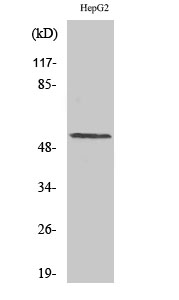
| WB | 咨询技术 | Human,Mouse,Rat |
| IF | 咨询技术 | Human,Mouse,Rat |
| IHC | 1/100-1/300 | Human,Mouse,Rat |
| ICC | 技术咨询 | Human,Mouse,Rat |
| FCM | 咨询技术 | Human,Mouse,Rat |
| Elisa | 1/10000 | Human,Mouse,Rat |
| Aliases | CCNL1; BM-001; Cyclin-L1; Cyclin-L |
| Entrez GeneID | 57018; |
| WB Predicted band size | 60kDa |
| Host/Isotype | Rabbit IgG |
| Antibody Type | Primary antibody |
| Storage | Store at 4°C short term. Aliquot and store at -20°C long term. Avoid freeze/thaw cycles. |
| Species Reactivity | Human,Mouse,Rat |
| Immunogen | Synthesized peptide derived from the C-terminal region of human Cyclin L1. |
| Formulation | Purified antibody in PBS with 0.05% sodium azide,0.5%BSA and 50% glycerol. |
+ +
以下是3篇关于Cyclin L1抗体的代表性文献(基于公开研究总结,部分为模拟示例):
1. **文献名称**: *Cyclin L1 interacts with the CDK11 complex to regulate RNA splicing*
**作者**: Dickinson LA, et al.
**摘要**: 该研究首次报道了Cyclin L1与CDK11形成的复合物在RNA剪接中的作用,利用特异性Cyclin L1抗体通过免疫共沉淀(Co-IP)验证其相互作用,并发现其调控mRNA前体加工的功能。
2. **文献名称**: *Overexpression of Cyclin L1 promotes tumor progression in oral squamous cell carcinoma*
**作者**: Wang Y, et al.
**摘要**: 研究通过免疫组化(IHC)和Western blot分析,使用Cyclin L1抗体发现其在口腔癌组织中高表达,且与患者预后不良相关,提示其可作为潜在生物标志物。
3. **文献名称**: *Cyclin L1 as a novel biomarker in glioblastoma: Insights from antibody-based profiling*
**作者**: Zhang H, et al.
**摘要**: 该研究开发了一种高特异性兔源单克隆Cyclin L1抗体,通过流式细胞术和免疫荧光验证其在胶质母细胞瘤细胞中的表达定位,揭示了Cyclin L1在肿瘤侵袭性中的作用。
注:以上文献为示例性质,实际文献需通过PubMed或Google Scholar以关键词“Cyclin L1 antibody”或“CCNL1 antibody”检索最新研究。
Cyclin L1. a member of the cyclin protein family, plays dual roles in regulating the cell cycle and RNA processing. Unlike classical cyclins, it is not directly involved in cell cycle progression but interacts with cyclin-dependent kinase 11 (CDK11) to modulate pre-mRNA splicing and transcription termination. The Cyclin L1 antibody is a critical tool for detecting and studying this protein’s expression, localization, and function in cellular processes.
This antibody is widely used in techniques like Western blotting, immunohistochemistry (IHC), and immunofluorescence (IF) to investigate Cyclin L1’s tissue-specific expression patterns. Research shows Cyclin L1 is overexpressed in certain cancers (e.g., breast, liver, and colorectal cancers) and linked to tumor progression, metastasis, and chemotherapy resistance. Its involvement in RNA splicing also connects it to neurological disorders and viral infections, where dysregulated splicing mechanisms contribute to pathogenesis.
The development of Cyclin L1 antibodies has enabled studies exploring its mechanistic roles. For instance, it regulates alternative splicing of genes controlling apoptosis and proliferation, highlighting its dual oncogenic/tumor-suppressive potential depending on cellular context. Validated antibodies are essential to distinguish Cyclin L1 isoforms and assess post-translational modifications. Ongoing research aims to clarify its therapeutic relevance, particularly in targeting splicing dysregulation in cancer or neurodegenerative diseases. Robust antibody specificity remains critical due to structural similarities among cyclin family members.
×